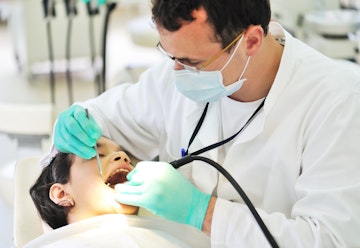Dental surgery: will I need an anaesthetic or sedation?

While the majority of dental procedures can be carried out using a local anaesthetic, there are some instances when we need to take extra steps to make you comfortable.
To make the experience as pain-free and comfortable as possible, dental surgery will require the patient to have some form of anaesthetic.
In the vast majority of cases where dental treatment such as fillings or tooth extraction are needed, the dentist will use a local anaesthetic.
What is a local anaesthetic?
A local anaesthetic allows us to control the area where you are unable to feel pain. First, a topical anaesthetic is placed on the gum where the anaesthetic will be injected. Next, a drug is injected into the gums around the tooth to be treated, which makes the area go numb.
This works by blocking nerve receptors so you do not feel any pain. Although you may still be aware of movement and the sensation of pressure, it won’t hurt and you won’t feel any discomfort.
Local anaesthetic takes just minutes to work and the numb feeling should wear off within a few hours. Patients remain awake and alert during treatment and can communicate with their dentist.
It is the preferred form of pain relief during dental procedures as its use is quick, easy and largely risk-free. Complications related to its use are very rare.
The only discomfort a patient would be expected to feel is when the local anaesthetic is injected. To minimise the discomfort, we can use a topical anaesthetic to numb the site before the injection.
If you are undergoing a surgical procedure, you may need more extensive pain management. There are times when dental surgery also requires sedation – this is usually in the cases of extremely anxious patients. Sedation can also be used to make long procedures feel much quicker for the patient.
Ultimately, conscious sedation helps you to relax, even if you are feeling nervous about the procedure. And a relaxed patient is far easier to treat, as they won’t flinch or move around as much.
When do dental patients need sedation?
Sedation is commonly used to help nervous patients relax. It will also help to make patients more cooperative during long procedures. It is typically reserved for longer procedures with some surgical element, such as extractions and dental implant procedures. Wisdom teeth extraction can also make patients feel nervous, so oral conscious sedation may be recommended.
For patients suffering from serious dental anxiety, this is something they may not be capable of without sedation. In these cases, it may be that the use of a sedative to relax them is the solution.
By inhaling gas and air (nitrous oxide) dental patients will become relaxed and, unlike general anaesthetic, will not have to lose consciousness. The effects last for only a short time – as little as 15 minutes.
Patients may also be offered intravenous sedation (IV sedation), which sees a drug injected into the patient. Again for severely anxious patients, IV sedation allows the patients to remain conscious through treatment, although in a deep state of relaxation – and due to the effects of the drug, they are unlikely to remember anything from the procedure. This can be ideal for those with complex dental trauma, as memories of the treatment won’t make their phobia of the dentist even worse.
The use of IV sedation is very safe, but the effects can take some time to wear off, so patients need the support of an adult on the day of treatment.
When do patients need general anaesthetic?
The use of general anaesthetic is very much a last resort in dental treatment.
It would only really be used in cases of complicated dental surgery – or in a tiny minority of people who are unsuitable for IV sedation.
General anaesthetic – where patients are unconscious – carries a higher risk of complications. As such its use is restricted to hospitals, where more complex dental surgery would take place.
Since you are put to sleep, you need to be given oxygen to ensure you can breathe normally and patients are also monitored to ensure their heart rate remains regular. The procedure is far more complicated and the recovery time is much longer. You may be asked to stay in hospital overnight until the effects of the anaesthetic wear off.
In the vast majority of cases though, dental treatment is quick, easy and over within an hour. Since the patient is asleep, it’s often easier for the dentist to complete their work.
Which choice is right for me?
If you are concerned about your upcoming dental treatment and would like to explore your options for sedation dentistry, we encourage you to speak to your dentist. Oral conscious sedation could help you to feel more relaxed throughout the procedure and will make longer procedures feel like they pass by much more quickly.
For more severe dental phobia, your dentist might recommend sedation, even if the procedure isn’t particularly long. For more advanced procedures, you may need to be referred to your local hospital where the procedure can be carried out under general anaesthetic.
If you have any concerns about dental treatment please get in touch with Bhandal Dental Surgery without hesitation.
Call us now to make an appointment

Keep reading...
How A Smile Makeover Can Increase Your Confidence
When patients want to achieve a dramatic transformation, we often recommend a smile makeover. This bespoke treatment plan can mean…
What is SmileFast?
SmileFast is a new dental treatment plan that allows you to achieve a dramatic smile transformation in as little time…
Anti-wrinkle injections - All you need FAQ's
The most common cosmetic treatment in the world now is anti-wrinkle injections. It's a simple and effective technique that involves…
What are Veneers?
Veneers are thin coats fitting over the teeth, protecting them from damage and creating a lovely smile. The tooth-coloured shells…

Hear from our
happy patients
These are just some of the kind words about our practice, direct from our incredible patients.









